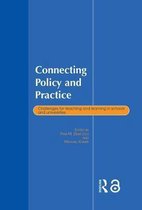Proof, Policy and Practice Understanding the Role of Evidence in Improving Education
Afbeeldingen
Sla de afbeeldingen overArtikel vergelijken
- Engels
- Paperback
- 9781579227517
- 17 december 2015
- 260 pagina's
Samenvatting
This book bridges the divide. It argues that unrealistic expectations lead to both unproductive research and impossible standards for “evidence-based” policy and practice, and it offers promising ways for evidence to contribute to improvement.
How can we “fix” our schools? Improve graduation rates in college? What works?These are questions that make the headlines and vex policy makers, practitioners, and educational researchers. While they strive to improve society, there are frequently gulfs of mutual incomprehension among them.Academics, longing for more influence, may wrongly fault irrationality, ideology, or ignorance for the failure of research to inform policy and practice more powerfully. Policy makers and practitioners may doubt that academics can deliver ideas that will reliably yield desirable results. This book bridges the divide. It argues that unrealistic expectations lead to both unproductive research and impossible standards for “evidence-based” policy and practice, and it offers promising ways for evidence to contribute to improvement. It analyzes the utility and limitations of the different research methods that have been applied to policy and practice, as well as the strengths and weaknesses of educational reform strategies. It explains why using evidence for “accountability” often makes things worse rather than better.Paul Lingenfelter offers educational researchers and policy makers a framework for considering such questions as: What problems are important and accessible? What methods will be fruitful? Which help policy makers and practitioners make choices and learn how to improve? What information is relevant? What knowledge is valid and useful? How can policy makers and practitioners establish a more productive division of labor based on their respective capabilities and limitations? He cautions against the illusion that straight-forward scientific approaches and data can be successfully applied to society’s most complex problems. While explaining why no single policy or intervention can solve complex problems, he concludes that determination, measurement, analysis, and adaptation based on evidence in specific situations can lead to significant improvement. This positive, even-handed introduction to the use of research for problem-solving concludes by suggesting emerging practices and approaches that can help scholars, practitioners, and policy leaders become more successful in reaching their fundamental goals.
Productspecificaties
Inhoud
- Taal
- en
- Bindwijze
- Paperback
- Oorspronkelijke releasedatum
- 17 december 2015
- Aantal pagina's
- 260
- Illustraties
- Nee
Betrokkenen
- Hoofdauteur
- Paul E. Lingenfelter
- Hoofduitgeverij
- Stylus Publishing
Overige kenmerken
- Extra groot lettertype
- Nee
- Product breedte
- 159 mm
- Product hoogte
- 19 mm
- Product lengte
- 235 mm
- Studieboek
- Nee
- Verpakking breedte
- 152 mm
- Verpakking hoogte
- 229 mm
- Verpakking lengte
- 229 mm
- Verpakkingsgewicht
- 408 g
EAN
- EAN
- 9781579227517
Je vindt dit artikel in
- Categorieën
- Taal
- Engels
- Boek, ebook of luisterboek?
- Boek
- Beschikbaarheid
- Leverbaar
- Studieboek of algemeen
- Algemene boeken
Kies gewenste uitvoering
Prijsinformatie en bestellen
De prijs van dit product is 34 euro en 99 cent.- Prijs inclusief verzendkosten, verstuurd door bol
- Ophalen bij een bol afhaalpunt mogelijk
- 30 dagen bedenktijd en gratis retourneren
- Dag en nacht klantenservice
Rapporteer dit artikel
Je wilt melding doen van illegale inhoud over dit artikel:
- Ik wil melding doen als klant
- Ik wil melding doen als autoriteit of trusted flagger
- Ik wil melding doen als partner
- Ik wil melding doen als merkhouder
Geen klant, autoriteit, trusted flagger, merkhouder of partner? Gebruik dan onderstaande link om melding te doen.








